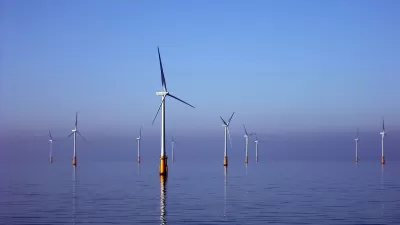Chinese wind-turbine manufacturers are making a push into the U.S. market. Some say the move will create green jobs and foster growth, while others worry it threatens America's still-developing industry.
While the U.S. is one of the largest producers of wind power in the world, wind currently meets only 2% of the country's electricity demand, according to Tom Zeller and Keith Bradsher. The industry has effectively stalled due to the economic crisis, but advocates hope the introduction of lower-priced turbines from China will restart growth. Chinese-manufactured turbines sell for $600,000 a megawatt versus $800,000 for Western models.
However, critics are particularly skeptical of Chinese companies, Zeller and Bradsher say. Although international manufacturers already play a role in U.S. wind, Chinese companies pose a unique threat to U.S. manufacturers because of the backing they receive from the country's government, the authors write:
"After G.E., the current market leaders in this country are Vestas of Denmark, Siemens of Germany, Mitsubishi of Japan and Suzlon of India. None of the governments of those countries, though, are suspected of unfairly favoring their home industries and discriminating against foreign competitors on anything approaching China's scale."
FULL STORY: China’s Push Into Wind Worries U.S. Industry

Planetizen Federal Action Tracker
A weekly monitor of how Trump’s orders and actions are impacting planners and planning in America.

Map: Where Senate Republicans Want to Sell Your Public Lands
For public land advocates, the Senate Republicans’ proposal to sell millions of acres of public land in the West is “the biggest fight of their careers.”

Restaurant Patios Were a Pandemic Win — Why Were They so Hard to Keep?
Social distancing requirements and changes in travel patterns prompted cities to pilot new uses for street and sidewalk space. Then it got complicated.

Platform Pilsner: Vancouver Transit Agency Releases... a Beer?
TransLink will receive a portion of every sale of the four-pack.

Toronto Weighs Cheaper Transit, Parking Hikes for Major Events
Special event rates would take effect during large festivals, sports games and concerts to ‘discourage driving, manage congestion and free up space for transit.”

Berlin to Consider Car-Free Zone Larger Than Manhattan
The area bound by the 22-mile Ringbahn would still allow 12 uses of a private automobile per year per person, and several other exemptions.
Urban Design for Planners 1: Software Tools
This six-course series explores essential urban design concepts using open source software and equips planners with the tools they need to participate fully in the urban design process.
Planning for Universal Design
Learn the tools for implementing Universal Design in planning regulations.
Heyer Gruel & Associates PA
JM Goldson LLC
Custer County Colorado
City of Camden Redevelopment Agency
City of Astoria
Transportation Research & Education Center (TREC) at Portland State University
Camden Redevelopment Agency
City of Claremont
Municipality of Princeton (NJ)



























